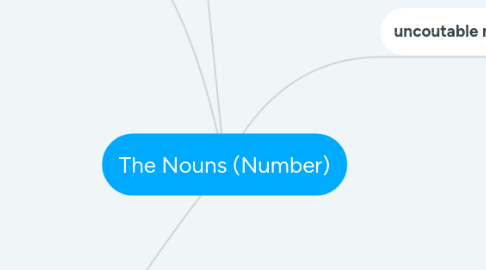
1. General:
1.1. Invariable + "the" can be used
1.2. Can't be preceded by a plural/ numeral/determiner + Can't use "one" or "a" but "some" or "any" yes!
2. Countable nouns
2.1. One/a/three/several/some/many... Table/Apple/Shirt/idea/argument...
3. Singular/Plural
3.1. Plural countable nouns
3.1.1. Terminaison en -is au sing devient -es au pluriel:
3.1.1.1. ex: crisis/crises - analysis/analyses - basis/bases
3.1.2. Terminaison en -on au sing devient -a au pluriel:
3.1.2.1. phenomenon/phenomena - criterion/criteria
3.1.3. Terminaison en -um au sing -a au pluriel:
3.1.3.1. medium/media
3.1.4. Index and Indices are invariable
3.2. >some words never add -s in the plural • Some names of animals Fish/ sheep/deer Ex: one sheep/ 400 sheep - Aircraft
3.3. > Some words already have an -s in the singular • Means (=way) Ex: there is one means/ there are two means of doing this • Series, species Ex: an endangered species • Crossroads… Ex: a dangerous crossroads
3.4. Clothes has no singular => a garment and People (des gens ou peuple) / person
3.5. Some words, plural in form always take a singular verb:
3.5.1. - Names of sciences ending in -ics Ex: physics / mathematics is my favourite subject - Some names of diseases : measles (rougeole)/ rabies (rage) Ex: Rabies is gaining ground in France - Some names of games Darts (fléchettes) / Draughts (dames) Ex: Is darts considered ... - Some names of countries Ex: The United States is going through a crisis.
3.6. Collective nouns refer to nouns which already in singular, refer to a plural reality. Basically, they refer to groups of people. --> But in English, they take first a singular verb, is you consider the group as a whole -->On the contrary, you will use a plural verb if you consider various elements (pas sûr) Ex: The Police are looking for the murderer.
3.7. some plural expressions of quantities can be sometimes used as singular expressions: >“a good” Ex : Cela nous a pris trois bonnes heures => It took us a good 3 hours. >With « another » or “an additional” Ex: We need another ten minutes. when several ppl possess one thing; there are 2 possibilities: - If they possess this singular thing together, the noun (of the thing possessed) is in the singular (French) Ex: Mary and her husband have sold their house. (= leur maison au sg en fr) -if they individually possess a similar singular thing, the noun (of the thing possessed) is in the plural Ex : John and Mark both sold their cars last month.
4. uncoutable nouns
4.1. Singular unc. nouns
4.1.1. Abstract nouns : Anger/Freedom
4.1.2. Même si en FR précédé de "un/une" il n'y a JAMAIS "a" en EN
4.1.2.1. Elle a une patience incroyable She shows ∅ incredible patience
4.1.3. Human activities: Work/Travel/Leisure
4.1.3.1. J’ai du travail I’ve got (some) work to do
4.1.3.2. un loisir qui coûte cher = a leisure activity which is very expensive
4.1.4. Names of substances and food: Water/Wood/Cotton/ Dust/Butter
4.1.4.1. Du savon/ Un savon == Some soap/ A bar of soap
4.1.5. Nouns whici correspon to regular countable nouns in French:
4.1.5.1. Advice (les conseils) Baggage/luggage (bagages) Furniture (meubles/ mobilier) News (nouvelles) Information∅ (renseignements) Evidence (preuves) Litter/ rubbish/ garbage/ trash (déchets/ordures) Fruit∅ Toast∅ INVARIABLE !
4.1.6. Global quantity = some/any/∅ Specific quantity = piece(s) of (only for this)
4.1.6.1. She eats ∅ toast/ two piece of toast every morning
4.1.7. EXCEPTIONS:
4.1.7.1. Progress (sing unc) : le/les progrès A step foward, a breakthrough Business (sing unc) : les affaires en général = le commerce Business is Business VS a deal Lightning :les éclaires/ la foudre There was lightning VS A flash of lightning Laughter: le rire/ les rires Damage (sing unc) : les dégâts Hair (sing unc) : les cheveux, la chevelure/ la coiffure VS a grey hair/ two grey hairs (countable)
4.1.7.1.1. And all these words are SINGULAR! meubles sont à vendre This furniture is for sale (vice-versa)
4.2. Plural unc. nouns
4.2.1. Things consisting of 2 symmetrical parts
4.2.2. Tools and Instruments
4.2.2.1. Scissors (ciseaux) Glasses (lunettes) Binoculars (jumelles) Tweezers (pince à épiler) Pliers (tenaille) Scales (balance)
4.2.3. Garments/ clothes
4.2.3.1. Trousers/ pants/ slacks Jeans Shorts Pyjamas (GB)/ Pajamas (US) Overalls (bleu de travail)
4.2.3.1.1. Ton jean est sale Your jeans are dirty
4.2.4. Contents (le contenu) Customs (la douane) Goods (la marchandise) Morals (la moralité) Spirits (le moral) Stairs (l’escalier) Wages (le salaire)
4.2.5. To specify a precise quantity (sing or plural) --> pair(s) of
4.2.5.1. Il a acheté un seul pantalon et deux shorts He bought one pair of trousers and two pairs of shorts.
